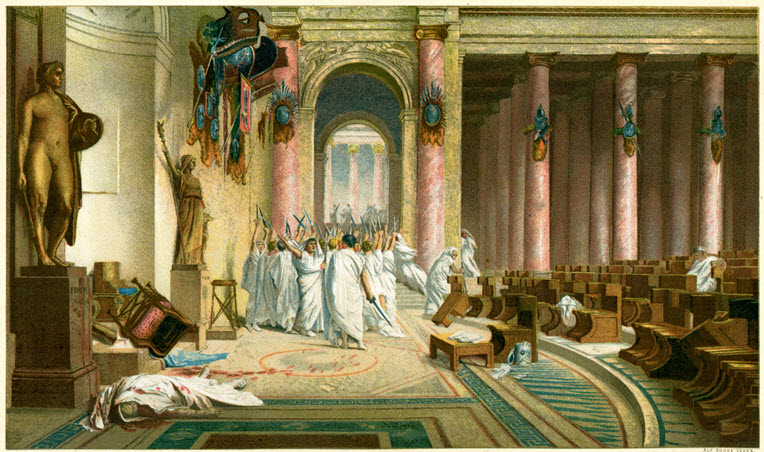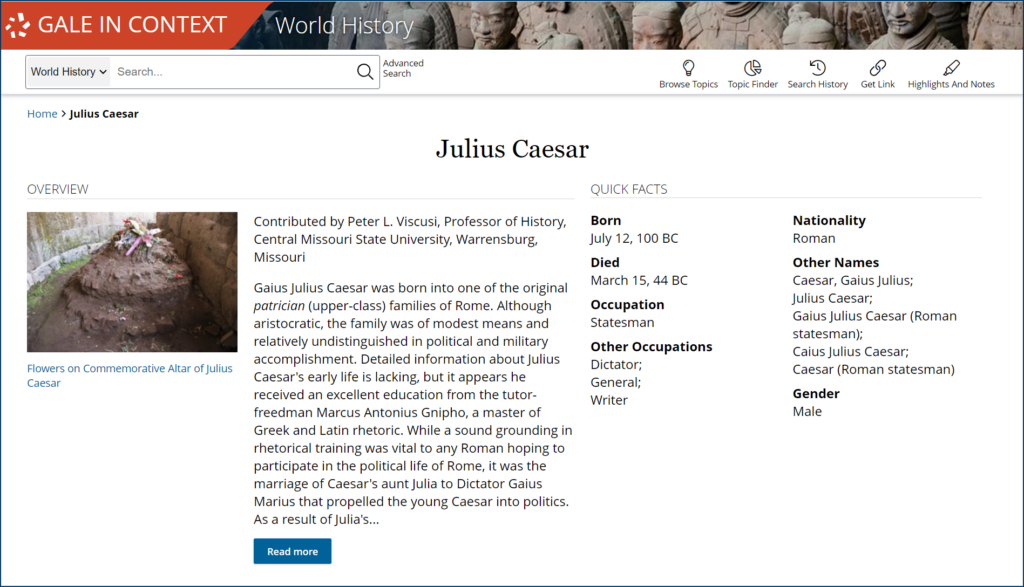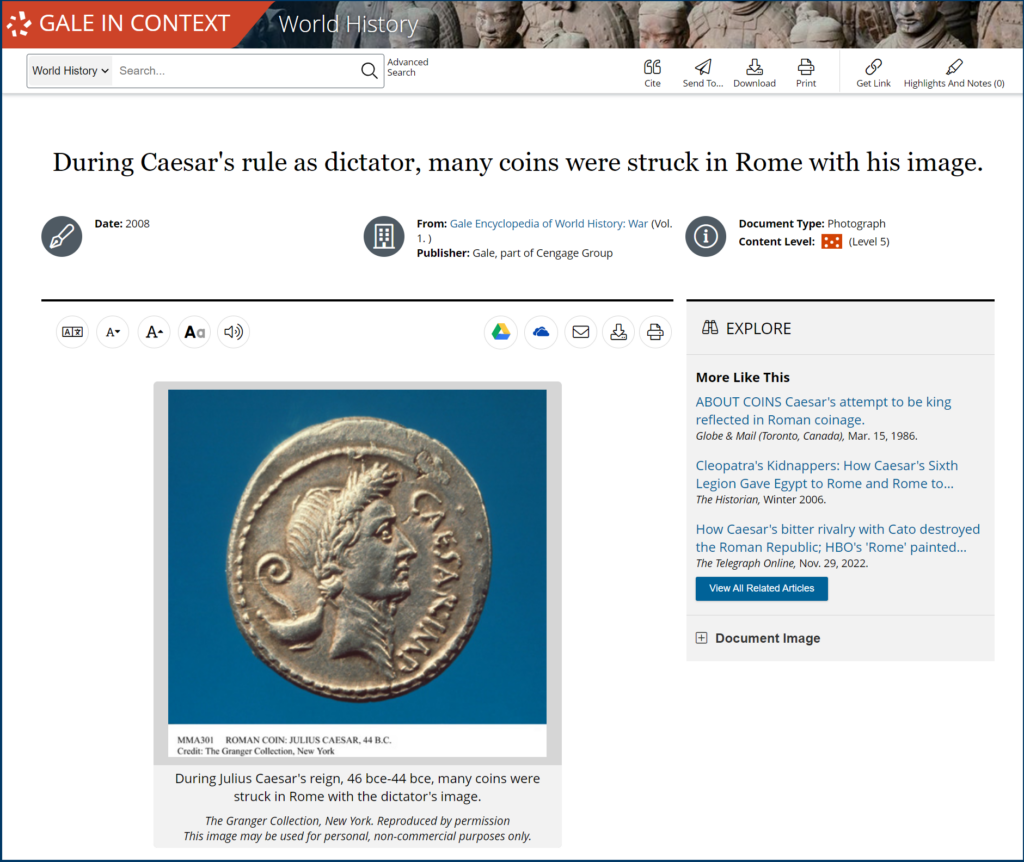| By Gale Staff |
In addition to being a storied general and a powerful politician, Julius Caesar was one of the most influential individuals in history. He helped shape society as we know it and continues to fascinate scholars.
With July 12 marking the birthday of this great Roman leader, use the occasion to highlight his place in history. Capture your students’ attention with a unique historical lesson plan featuring Julius Caesar’s life, leadership, and infamous assassination. Explore the details of his time as a soldier and learn about his rise to power and the defeat of his political rival, Pompey. Discover his legendary affair with Cleopatra and examine the shocking betrayal behind his death. What can Julius Caesar teach us, and how do his failings and accomplishments continue to permeate Western culture?
To get started on your lesson plan and invigorate student research, turn to Gale In Context: World History. Gale’s collection provides a vetted foundation for Caesar’s complicated legacy, with commentary on the Roman leader—both critical and celebratory—from around the world. You will find publications from Australia, Northern Ireland, Saudi Arabia, South Africa, and more.
This thoughtful collection gives students a valuable global perspective through biographical entries, targeted publications, and scholarly articles. By encouraging open-minded, diverse approaches to research, the content in Gale In Context: World History fosters the big-picture, critical thinking skills your students need to succeed after graduation.
Discover Caesar’s Early Life
While little evidence exists about Julius Caesar’s early life, Gale in Context: World History houses an easy-to-digest biographical summary page to help answer basic questions about the young Caesar. Born in July 100 BC in Rome, Gaius Julius Caesar had a somewhat uneventful upbringing. However, he was not without privilege; his father was a senator, and his aunt married into prominence as well.
His familial connections assisted Caesar’s early career in Roman politics, and he became an advocate for the Populares party, which believed in a more significant role for the common people. Populism remains a dominant political strategy worldwide, and your students may discover similarities between Caesar and modern world leaders who thrive by galvanizing public appeal.
However, his political leanings pushed him out of favor of the then-ruling government, the Optimates, and Caesar would instead find success on the battlefront. He soon became a decorated soldier. His accolades in battle, combined with his political connections, would position him well for a significant role within the evolving Roman government.
Learn About His Accomplishments
Caesar’s popularity and position within Roman politics afforded him a lavish lifestyle that helped him accumulate powerful friends. By 65 BC, he was hosting the famous gladiatorial games of Ancient Rome. His wealthy connections and impressive oratory skills spurred his political trajectory, and Caesar was soon instrumental in the region’s governance.
In 49 BC, in a rebellion against the Optimate party, Caesar led an army across the Rubicon River to face his chief political opponent—General Pompey. A year later, despite being vastly outnumbered, he defeated his rival’s army at the Battle of Pharsalus, cementing his legacy as a renowned military leader.
Caesar assumed unrestrained power in Rome and began implementing public reforms. As in his youth, he indulged in finery and self-glorification, naming himself “dictator for life.” His visage appeared on coins and he often wore a purple toga—a color traditionally reserved for deities.
While adored by the public, Caesar’s unmitigated influence and unchecked power would come to a sudden, untimely end. On March 15, 44 BC, a group of Caesar’s former rivals, alongside some of his closest confidants, publicly assassinated the great ruler.
Discuss His Legacy
Like so many great leaders, Julius Caesar’s life is controversial. Regardless, he was instrumental in shaping the modern world as we know it. The Roman Empire influenced everything from art and architecture to literature and law. Caesar expanded Roman culture throughout the region and introduced meaningful public reforms for retired military members and the country’s lower class. He extended citizenship to conquered peoples, lowered taxes, brought stability to the Empire, and invested in infrastructure such as the Forum Iulium.
At the same time, he undermined democracy, and initiated a civil war—and many historians consider him to have been a ruthless leader. As demonstrated throughout his life, Caesar loved personal glory, leaving scholars to question whether his many accomplishments were a matter of historical fact or an exaggerated account. An article in The Economist went so far as to comment, “Caesar peddled fake news worthy of any modern demagogue.”
So, was Caesar a manipulative dictator or a hero for the people? With evidence from Gale in Context: World History, encourage your students to form their answers. If anything, his contradictory legacy demonstrates the remarkable nuance within world history.
Consider Caesar’s Role in Modern Media
Many great military and political minds have existed throughout history, but Julius Caesar stands apart. Even today, his name and accomplishments appear throughout popular culture, from Shakespeare’s plays to Jay-Z lyrics. “Crossing the Rubicon” is a common idiom for “passing the point of no return.” The month of July is even named after the accomplished Roman leader.
In 2017, a New York theater company styled its interpretation of Julius Caesar in the guise of then-president Donald Trump, aiming for a commentary on American politics and the threat of authoritarianism. However, the artistic decision and graphic assassination incited heated protests, with Trump supporters calling out the “normalization of political violence against the right.” Considering how one man’s name and visage transcends millennia and still inspires such a strong reaction is genuinely astonishing. Ask students to consider why Caesar’s life is so compelling. What does his life teach us about morality—and why do these lessons continue to appear in media and culture thousands of years later?
As part of Gale’s extensive academic collection, Gale In Context: World History is a valuable classroom resource for educators and students. Its curated, user-friendly content and learning tools include text-to-speech features and dozens of translation options, making learning both accessible and fascinating. Regardless of your topic, you can rely on Gale to stimulate student curiosity and empower lifelong learning.
If your institution does not already subscribe to Gale in Context: World History, reach out to your local representative to learn more and request a product trial.



